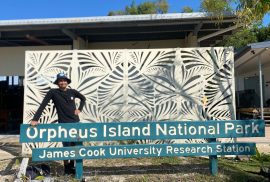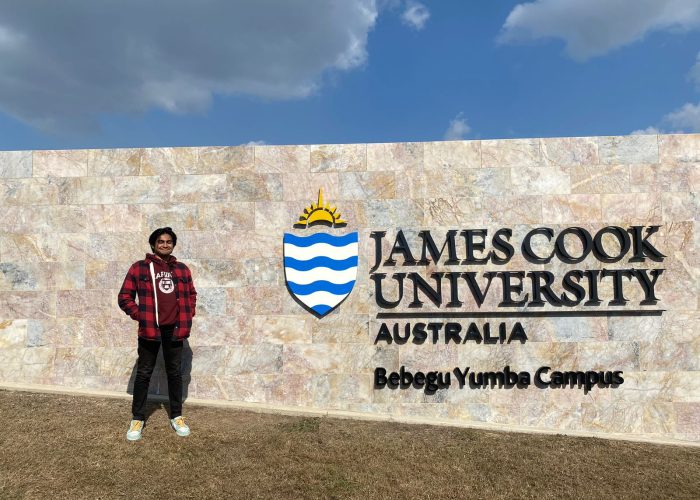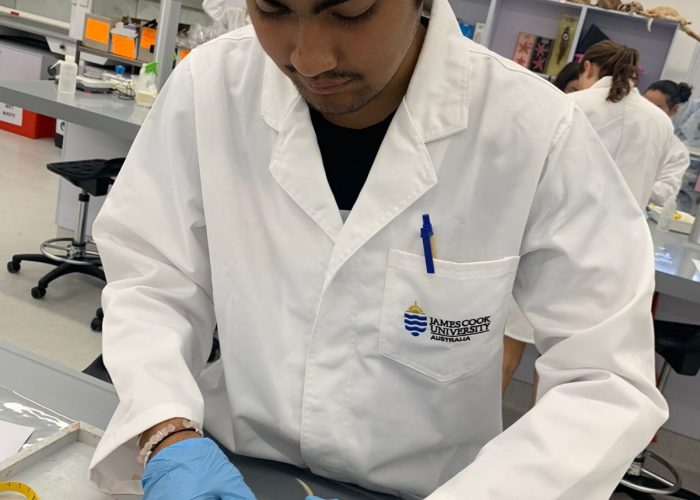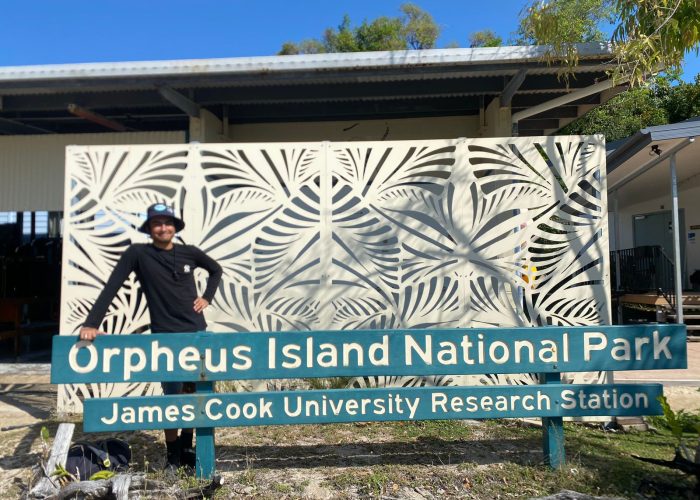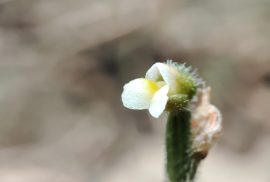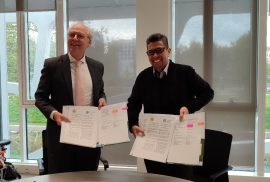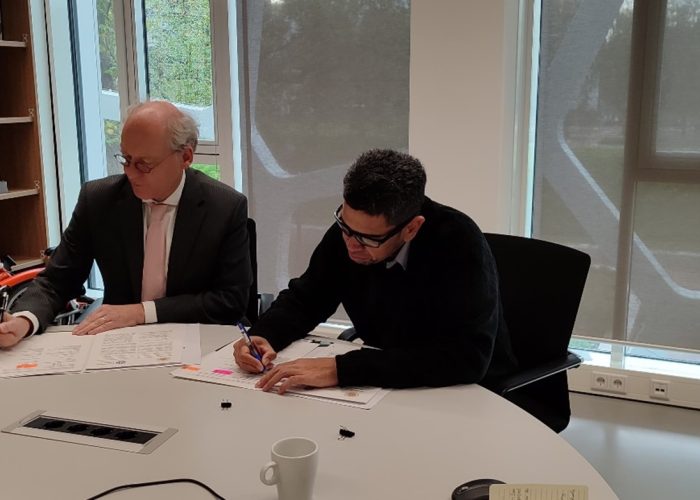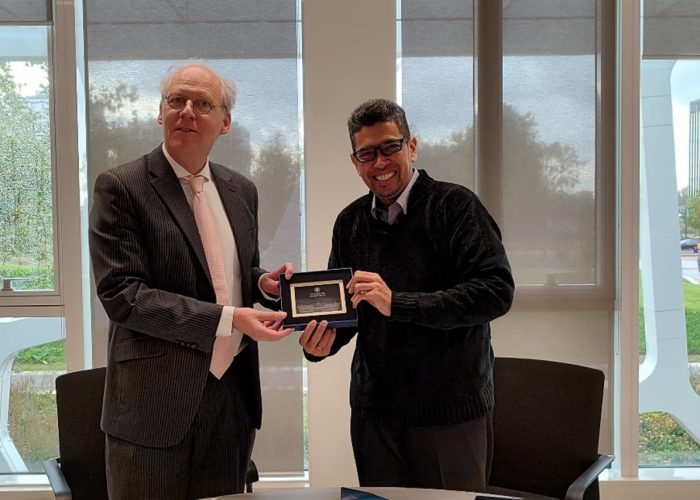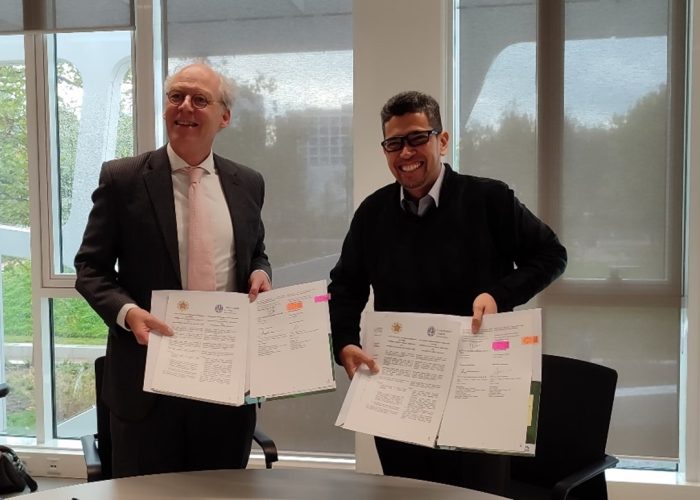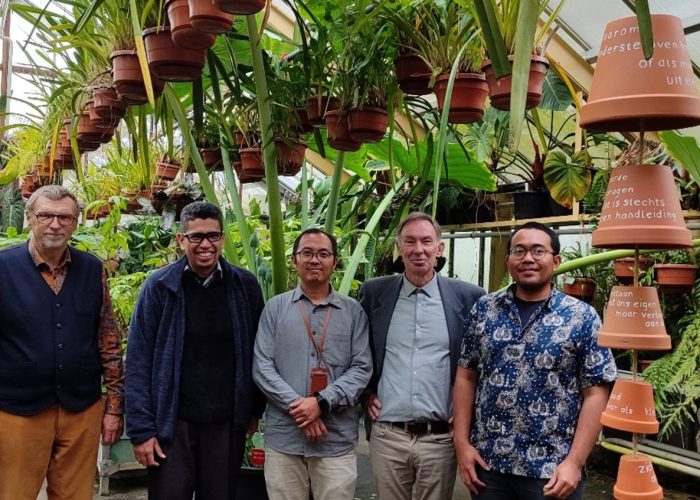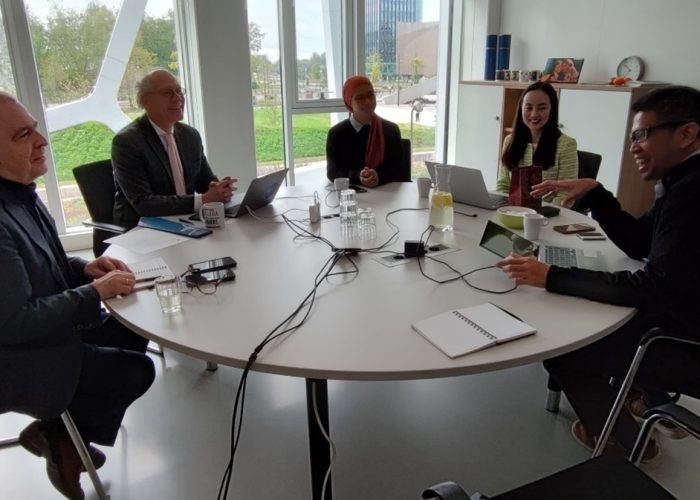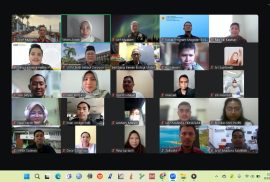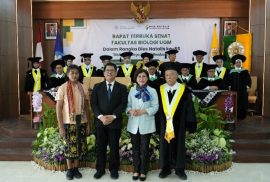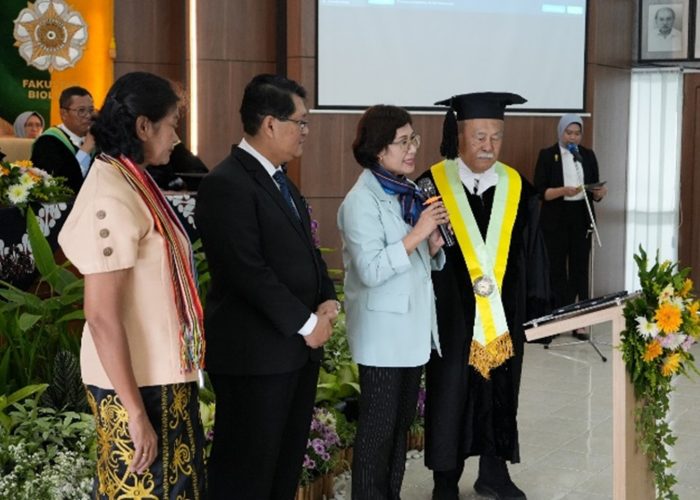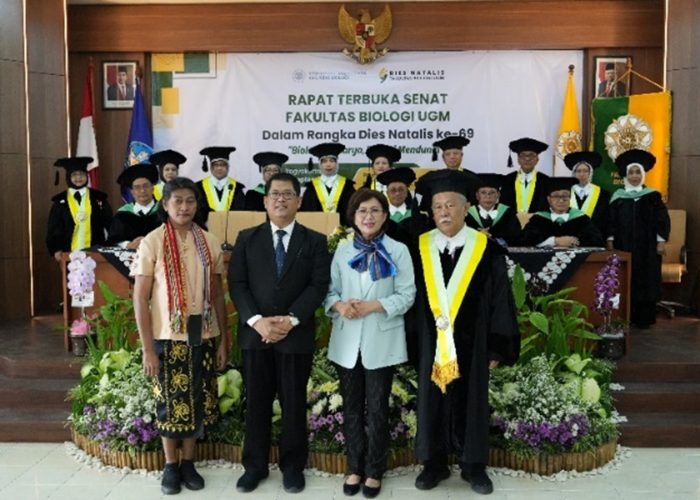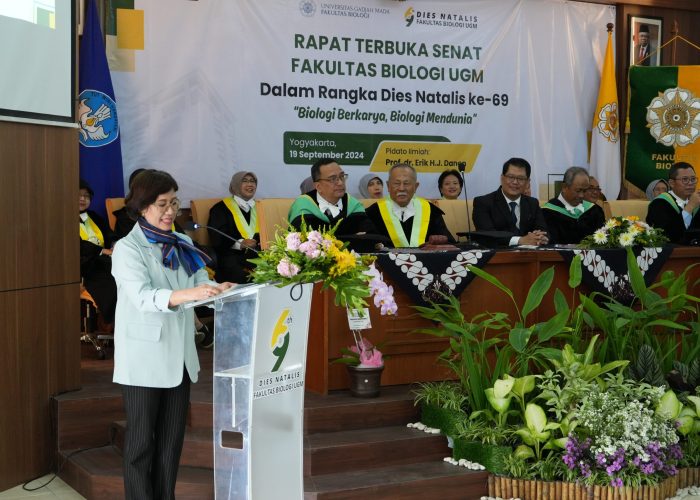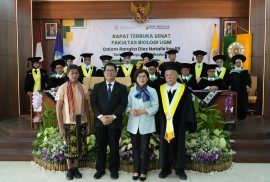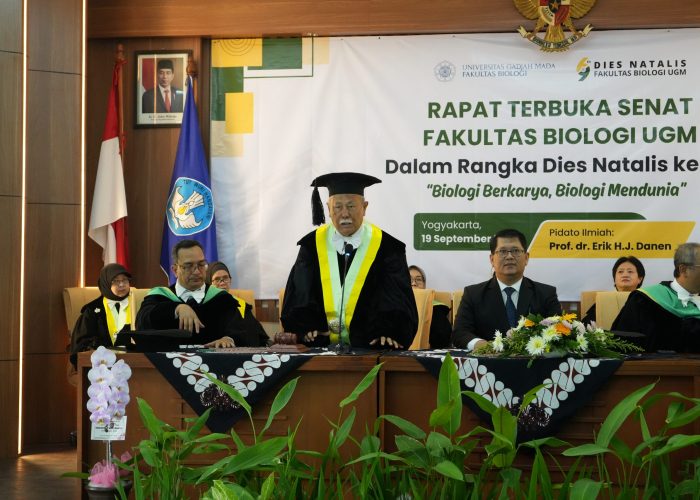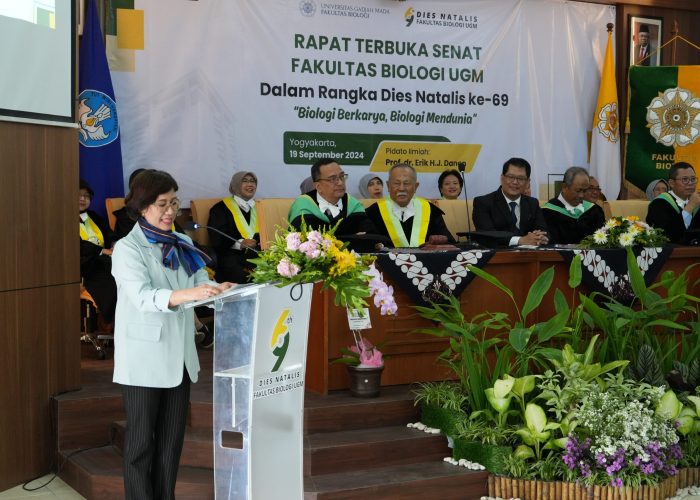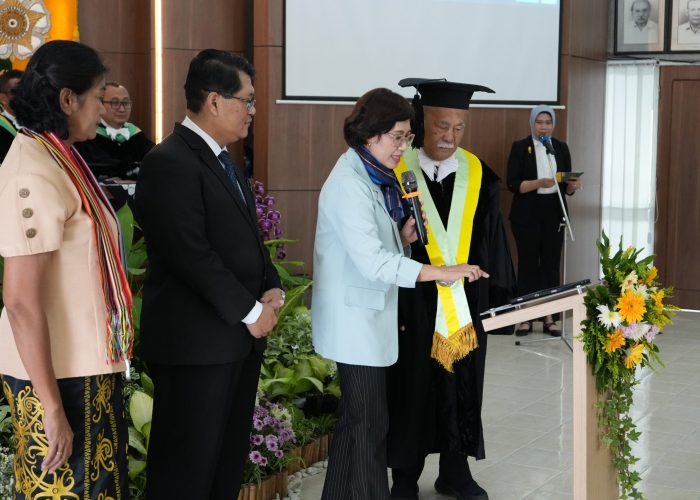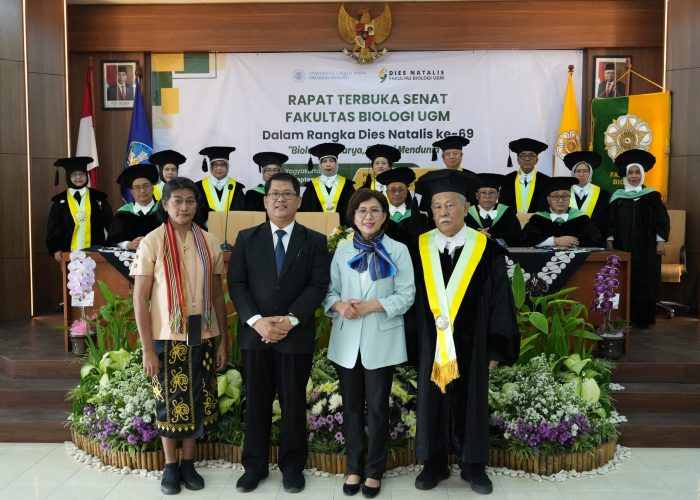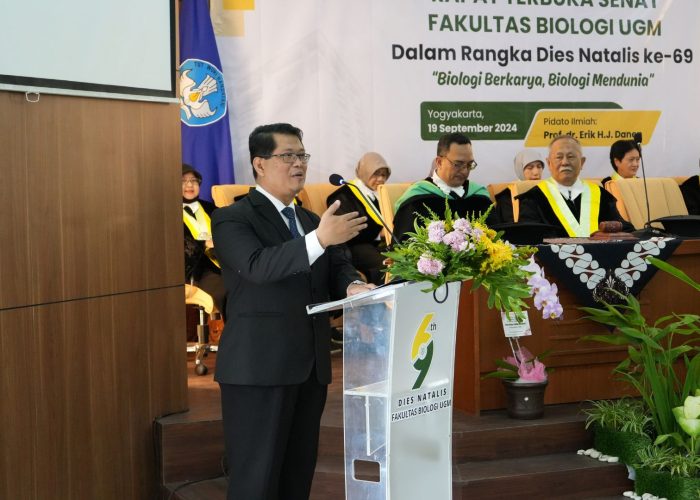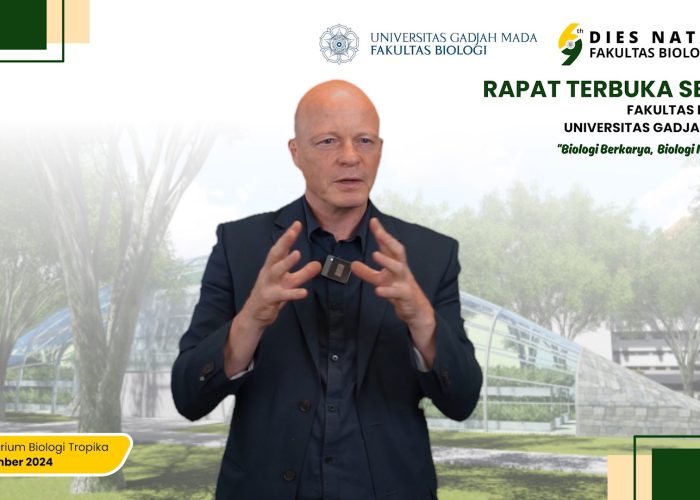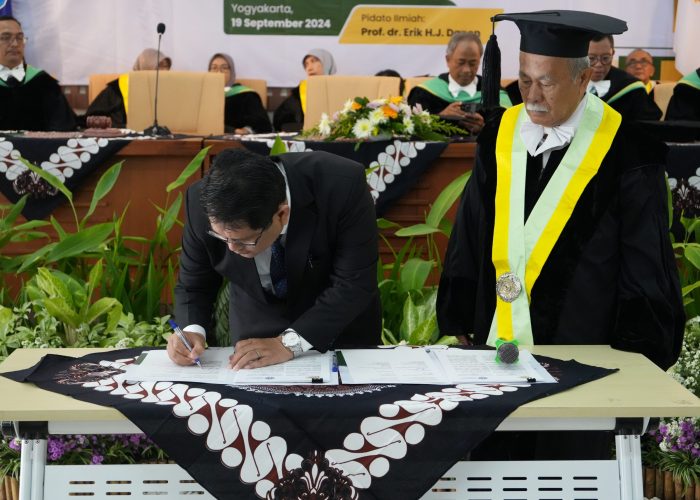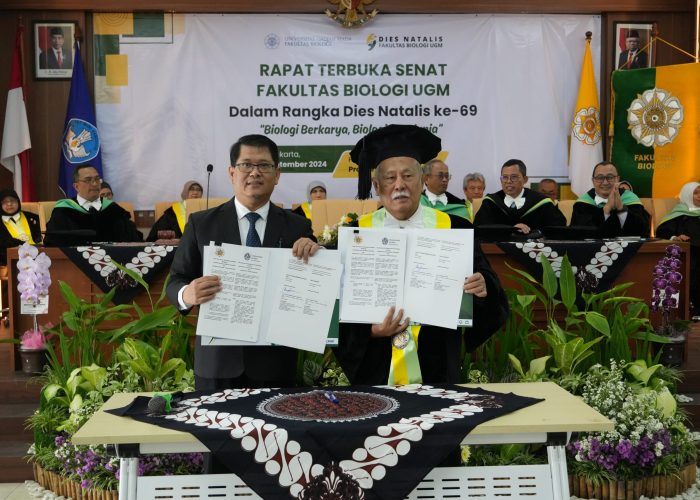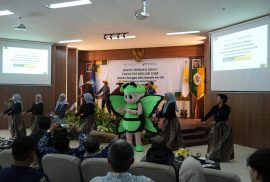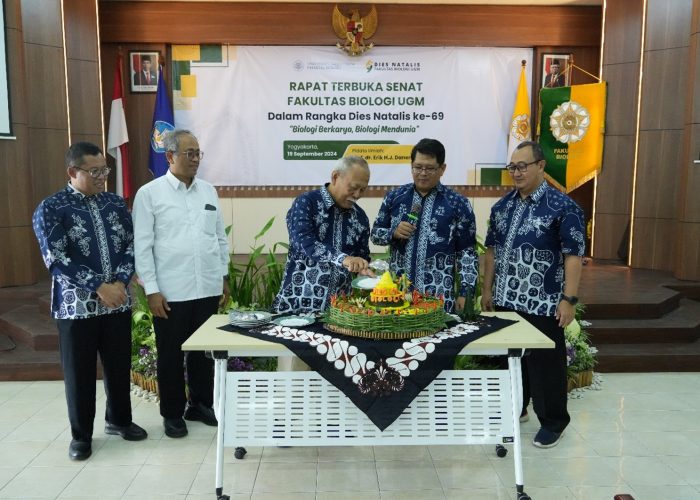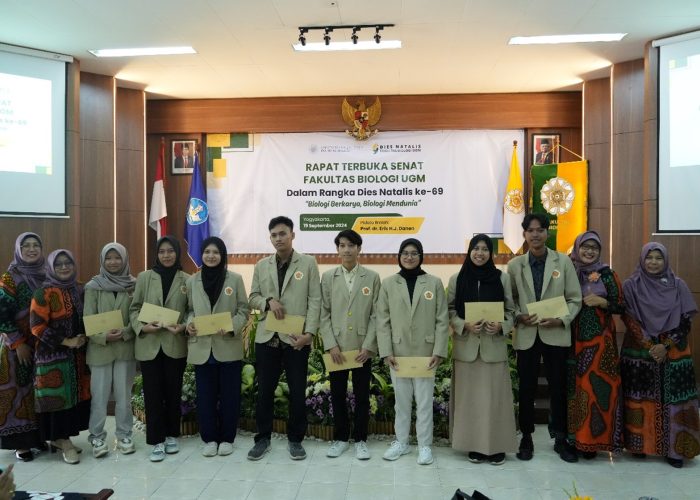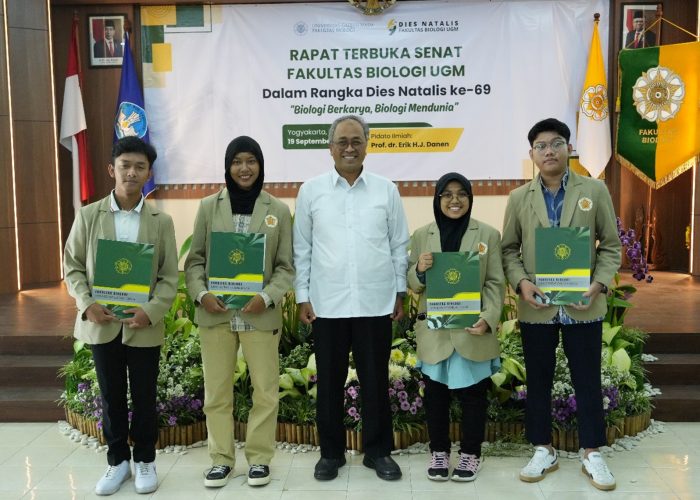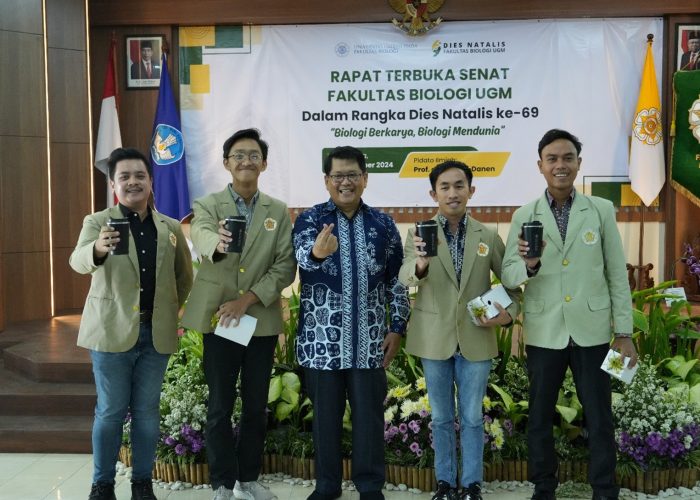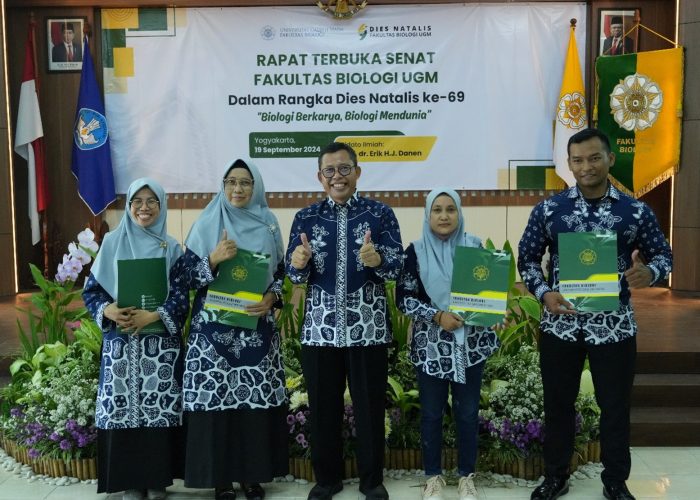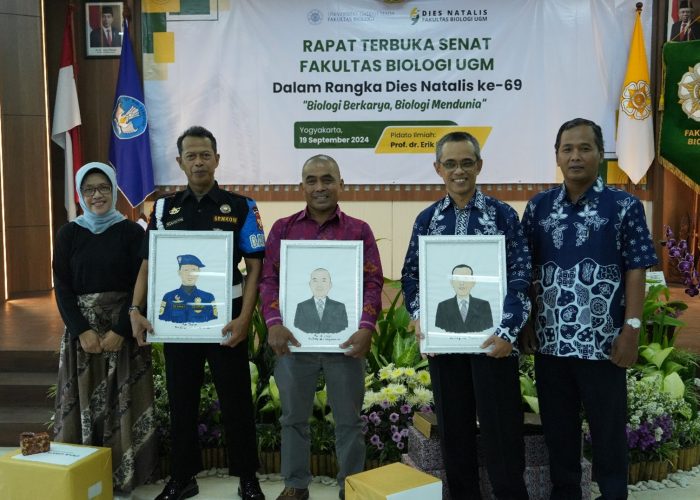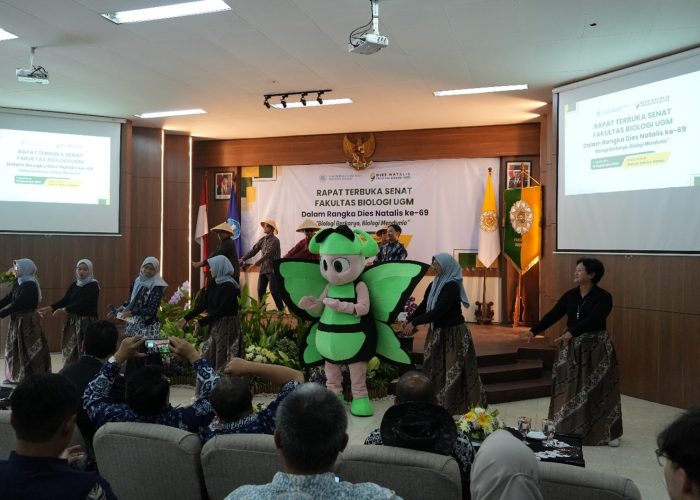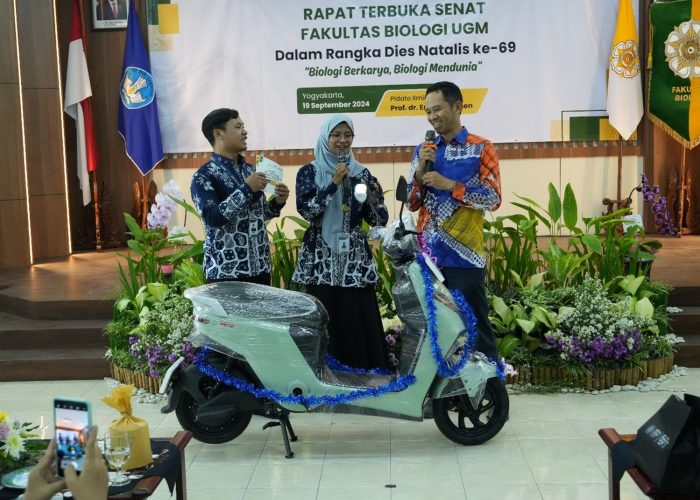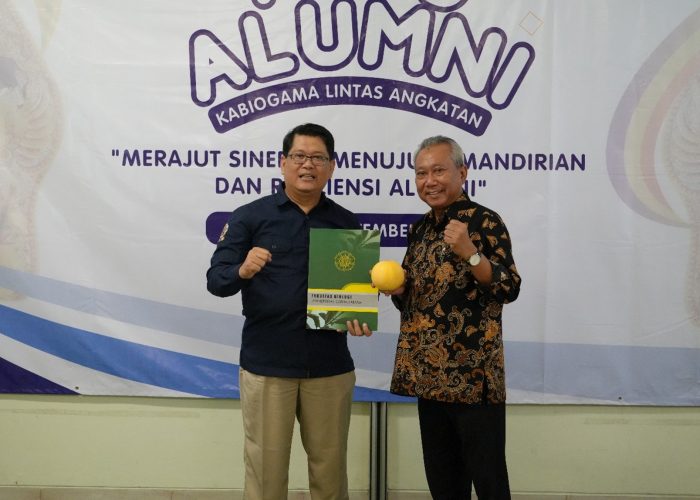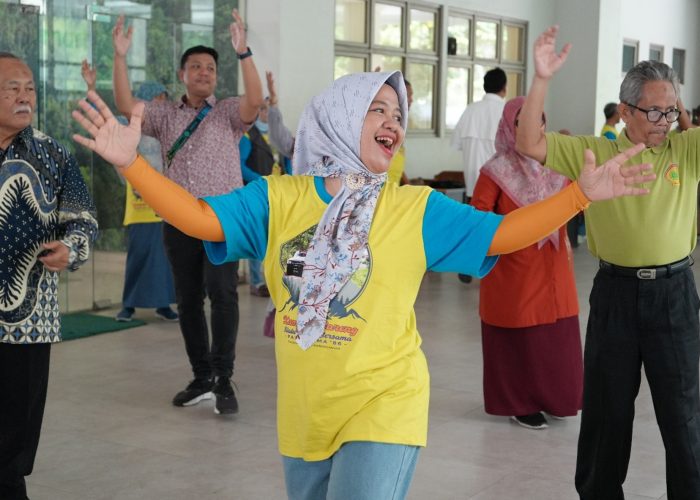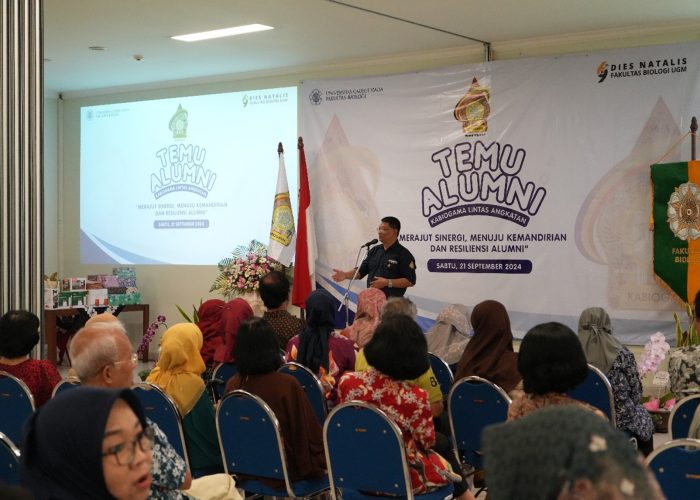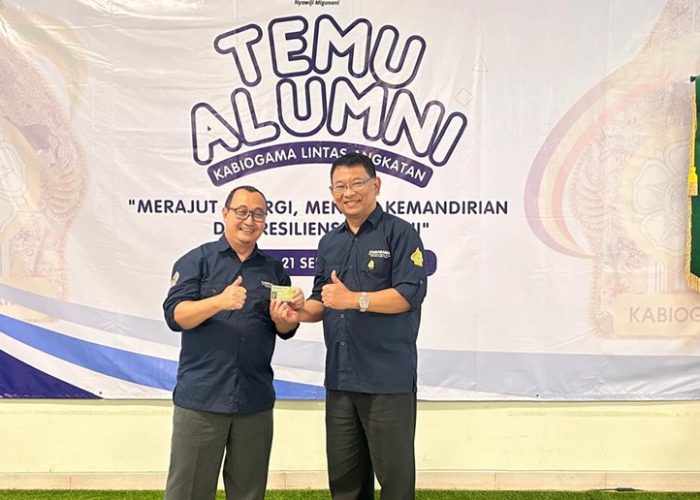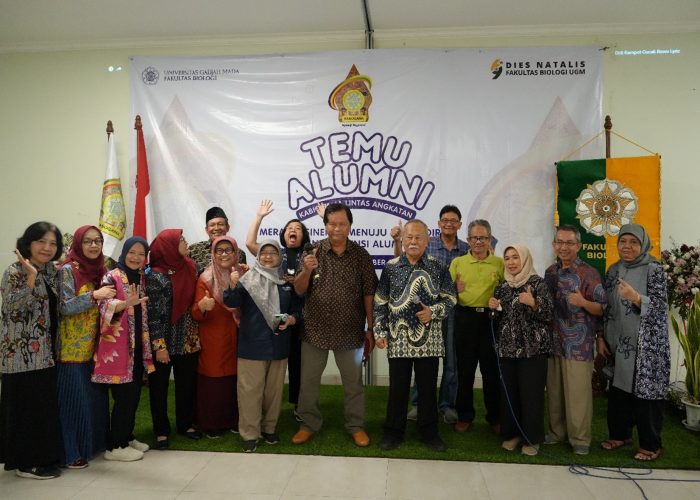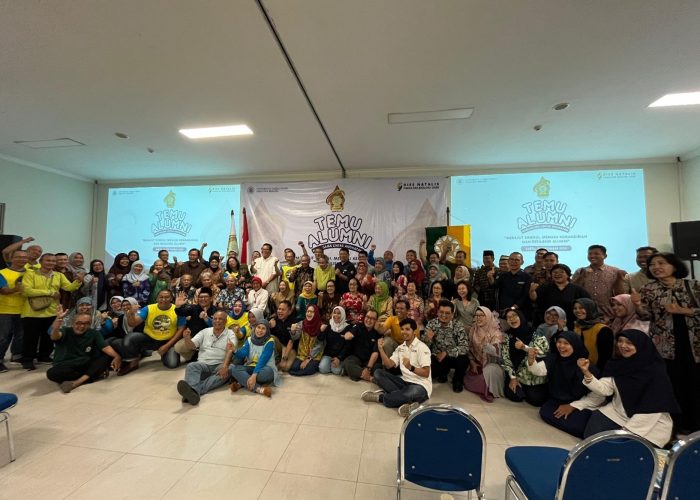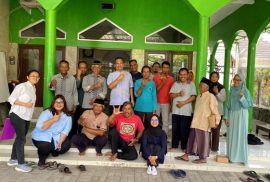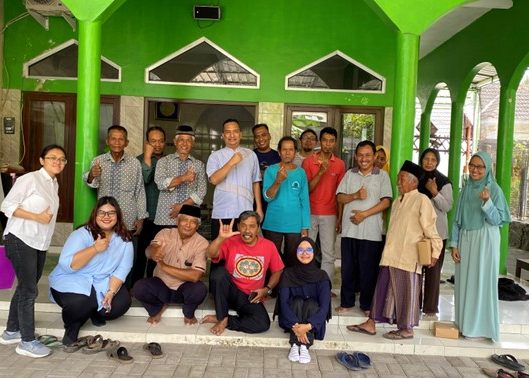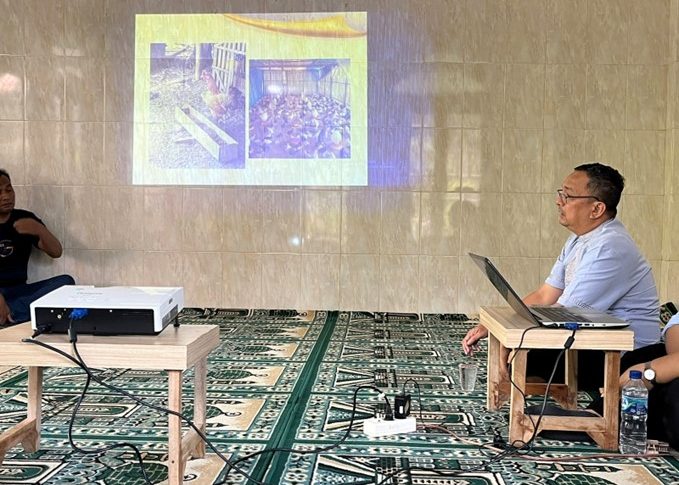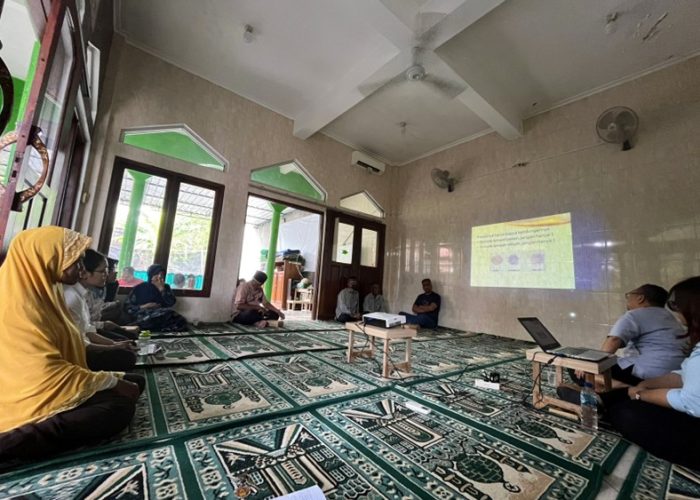Arsip:
SDG 17 : Build Partnerships for the Goals
Wildan Fadhilah Kurnia, a 2021 cohort student in the International Undergraduate Program (IUP) of the Faculty of Biology at Universitas Gadjah Mada (UGM), has been participating in a prestigious six-month student mobility program at James Cook University (JCU), Australia. This program is designed to offer students invaluable international experience and the opportunity to study at one of the world’s leading universities in Marine Biology.
Wildan has found his experience at JCU to be exceptional. “The research conducted here is renowned globally in various fields, particularly marine biology, aquaculture, and paleontology,” he remarked. Enrolled in courses from the faculties of Marine Biology, Aquaculture, and Earth and Environmental Sciences, he is impressed by JCU’s state-of-the-art research facilities and highly interactive classes that foster critical thinking.
Wildan’s curriculum has provided him with direct fieldwork opportunities, allowing him to engage closely with the subject matter. He spent time at the Flinders River, searching for fossils and studying the stratigraphy of geological formations. Additionally, he visited several aquaculture facilities, gaining firsthand insights into the diverse species cultivated within the industry.
A highlight of his program was a visit to JCU’s Orpheus Island Research Station, where he participated in hands-on analysis of coral reefs surrounding the island. “Each course presents its own challenges, but I have thoroughly enjoyed my studies here and have learned so much,” Wildan said.
In addition to his coursework, Wildan is collaborating with Dr. Espen Knutsen, Senior Scientist and Curator of Paleontology at the Queensland Museum in Townsville, to further his ongoing research on fossils found in underwater caves. Wildan hopes to apply the knowledge and insights he has gained in his future endeavors. [Aulia]
On September 21, 2024, the Conservation Division of the Biology Orchid Study Club (BiOSC) Universitas Gadjah Mada conducted an exploration activity at Curug Siluwok. This regular activity acted as a foundational step in the conservation of native orchid species.
Curug Siluwok was selected as the exploration site due to its status as a prominent ecotourism destination in the Special Region of Yogyakarta. The prevalence of orchid species in this area is particularly susceptible to disturbances from tourist activities. The exploration involved ten active members of BiOSC and aimed to document the native orchid species in Curug Siluwok, thereby augmenting the biodiversity database of orchids in the Special Region of Yogyakarta, particularly within the Menoreh Highland.
The exploration commenced with a comprehensive briefing session in the morning to prepare participants for field activities and assign specific responsibilities. Subsequently, the team embarked on a journey to the exploration site, which took approximately one hour. Upon arrival at Curug Siluwok at 09:00, participants collected data on orchids in Curug Siluwok, including morphological characteristics, the enumeration of individual orchids encountered, geographic coordinates of each orchid’s location, and environmental parameters. The investigation resulted in the identification of 11 orchid species at the Curug Siluwok site, including Vanilla planifolia Andrews, Dendrobium crumenatum Sw., Bryobrium retusum (Blume) Ng & Cribb, Acriopsis lilifolia (Koenig) Ormerod, Rhynchostylis retusa (L.) Blume, Aerides odorata Lour., Liparis condylobulbon Rchb.f., Zeuxine clandestina Blume, Spathoglottis plicata Blume, Malaxis sp., and Thrixspermum sp. The data will contribute to the conservation records of native orchids and enhance our understanding of orchid biodiversity within the Special Region of Yogyakarta, particularly in the Menoreh Highland.
It is hoped that the regular exploratory activities will enrich the existing knowledge base concerning the distribution of various orchid species in the Menoreh Highland, specifically at Curug Siluwok, thus supporting the conservation of orchid species within the Special Region of Yogyakarta. Following this exploration, the Conservation Division will implement ongoing monitoring in the Curug Siluwok area to ensure the continued growth and sustainability of the native orchid populations.
Leiden, September 25, 2024 – Faculty of Biology Universitas Gadjah Mada has once again expanded its recognition in the international arena through collaboration with one of the world’s best universities, Leiden University, the Netherlands. Located in the Gorlaeus Building, Faculty of Science, Leiden University, Faculty of Biology UGM officially established a Joint Doctoral Degree Agreement with the Graduate School, Faculty of Science, Leiden University. The official signing was carried out by the Dean of the Faculty of Science, Leiden University, Prof. dr. Jasper Knoester accompanied by Prof. Mirwan Ushada, S.TP., M.App.Life.Sc. as the Director of Research at UGM and Luthfi Nurhidayat, M.Sc. as a Lecturer at the Faculty of Biology UGM and Ph.D. student at the Institute of Biology, Leiden University. The agreement was previously signed by the Dean of the Faculty of Biology UGM, Prof. Dr. Budi Setiadi Daryono, M.Agr.Sc. on the agenda of the 69th Anniversary of the Faculty of Biology, as well as by the Rector of UGM, Prof. dr. Ova Emilia, M.Med.Ed., Sp.OG(K)., Ph.D.
Prof. Jasper expressed his hope that the signing of this MoA will make the cooperation between UGM and Leiden, especially the two Faculties, even closer and there will be immediate follow-up with the presence of Ph.D. students.
Through this opportunity, Prof. Mirwan conveyed that the collaboration between Leiden University and Universitas Gadjah Mada had previously taken place, especially for the INUCoST (Indonesian Netherland University Consortium on Sustainable Future) collaboration which next year will focus on the theme of health, as well as the collaboration to establish the Zebrafish Research Facility. The Research Director UGM hopes that this collaboration can be strengthened by the presence of Ph.D. students who conduct research using the facility to support the development of research in the field of health and testing of Indonesian natural products. The meeting was also attended by Dr. Pieter Schipper as Head of Academic Affairs Science, Prof. dr. Herman Spaink who is also an adjunct professor at the Faculty of Biology UGM, and Prof. Paul Kessler from Hortus Botanicus Leiden University.
Through this collaboration, it is hoped that it can contribute to the development of research with education in Indonesia, in line with support for the sustainable development goals (SDGs), especially support for inclusive education through sustainable partnerships (SDG 4 and SDG 17).
Yogyakarta, 18 September 2024 – The Faculty of Biology Universitas Gadjah Mada (UGM) held a guest lecture as part of the Graduate Program orientation for the 2024/2025 academic year. The guest lecture titled “Population Biology, Biological Control, and Conservation” was conducted online via Zoom from 3:30 to 5:00 PM WIB, and attended by 56 graduate students. The event aims to provide essential insights to new graduate students and is held twice a year.
This semester’s guest lecture featured Prof. Dr. Bambang Irawan, M.Sc. as speaker, a prominent biologist from Universitas Airlangga and an alumnus of UGM’s Faculty of Biology. Prof. Irawan is a noted expert in population biology and biological control. During his undergraduate years at UGM, he earned the honorary title Glericidae, reflecting his academic achievements and focus on reptilian studies. The session was opened by Wiwin Ariesti, S.Si., as the Master of Ceremony, and moderated by Nurul Hidayah, S.Pd. It began with the singing of “Indonesia Raya,” UGM’s “Hymne Gadjah Mada,” and the Faculty of Biology March. The Dean of the Faculty of Biology, Prof. Dr. Budi Setiadi Daryono, M.Agr.Sc., delivered the opening remarks, underscoring the importance of population biology in addressing pressing global ecological challenges.
The main lecture, “Population Biology, Biological Control, and Conservation”, began at 4:00 PM with an engaging reflection by Prof. Irawan on his experiences as a UGM undergraduate. He transitioned into a thorough scientific discussion on the role of population biology in ecological research and conservation. Prof. Irawan delivered an overview of population biology, the distinction between population ecology and genetic population dynamics, population parameters, population equilibrium, and the role of population biology in biological control.
Throughout the lecture, Prof. Irawan emphasized the interdisciplinary relevance of population biology, linking it to broader fields such as sociology, economics, demography, and politics. He also shared practical examples from his research, illustrating methods for pest management and conservation, from traditional approaches to more advanced techniques.
The lecture concluded with an interactive question-and-answer session, where students engaged with Prof. Irawan on various aspects of population biology. His ability to connect theoretical concepts with real-world applications fostered a lively and informative discussion. After approximately 45 minutes of in-depth material, the session ended with closing remarks by the moderator, followed by a formal close from the MC.
This guest lecture marked a successful orientation event for new graduate students at UGM’s Faculty of Biology, broadening their understanding of population biology, biological control, and conservation.
Yogyakarta, 18 September 2024 – The Faculty of Biology Universitas Gadjah Mada (UGM) held a guest lecture as part of the Graduate Program orientation for the 2024/2025 academic year. The guest lecture titled “Population Biology, Biological Control, and Conservation” was conducted online via Zoom from 3:30 to 5:00 PM WIB, and attended by 56 graduate students. The event aims to provide essential insights to new graduate students and is held twice a year.
This semester’s guest lecture featured Prof. Dr. Bambang Irawan, M.Sc. as speaker, a prominent biologist from Universitas Airlangga and an alumnus of UGM’s Faculty of Biology. Prof. Irawan is a noted expert in population biology and biological control. During his undergraduate years at UGM, he earned the honorary title Glericidae, reflecting his academic achievements and focus on reptilian studies. The session was opened by Wiwin Ariesti, S.Si., as the Master of Ceremony, and moderated by Nurul Hidayah, S.Pd. It began with the singing of “Indonesia Raya,” UGM’s “Hymne Gadjah Mada,” and the Faculty of Biology March. The Dean of the Faculty of Biology, Prof. Dr. Budi Setiadi Daryono, M.Agr.Sc., delivered the opening remarks, underscoring the importance of population biology in addressing pressing global ecological challenges.
The main lecture, “Population Biology, Biological Control, and Conservation”, began at 4:00 PM with an engaging reflection by Prof. Irawan on his experiences as a UGM undergraduate. He transitioned into a thorough scientific discussion on the role of population biology in ecological research and conservation. Prof. Irawan delivered an overview of population biology, the distinction between population ecology and genetic population dynamics, population parameters, population equilibrium, and the role of population biology in biological control.
Throughout the lecture, Prof. Irawan emphasized the interdisciplinary relevance of population biology, linking it to broader fields such as sociology, economics, demography, and politics. He also shared practical examples from his research, illustrating methods for pest management and conservation, from traditional approaches to more advanced techniques.
The lecture concluded with an interactive question-and-answer session, where students engaged with Prof. Irawan on various aspects of population biology. His ability to connect theoretical concepts with real-world applications fostered a lively and informative discussion. After approximately 45 minutes of in-depth material, the session ended with closing remarks by the moderator, followed by a formal close from the MC.
This guest lecture marked a successful orientation event for new graduate students at UGM’s Faculty of Biology, broadening their understanding of population biology, biological control, and conservation.
To mark its 69th Anniversary, the Faculty of Biology Universitas Gadjah Mada (UGM) has launched the Integrated Genome Factory (IGF), a facility designed for advanced multi-omics research. The launch occurred during the Open Senate Meeting, themed “Biology in Action, Biology Goes Global,” on September 19, 2024, at the Tropical Biology Auditorium. The IGF was inaugurated by UGM Rector, Prof. dr. Ova Emilia, M.Med.Ed., Sp.OG(K)., Ph.D., symbolized to begin DNA sequencing using Oxford Nanopore Technology (ONT).
The IGF is equipped with the ONT PromethION 24, capable of sequencing up to 720 Gb of DNA per day, supported by a Data Acquisition Unit (DAU) with powerful quad Nvidia A100 GPUs and a 160-core CPU for efficient data processing. The facility also features automated systems like the Opentrons Flex and automated DNA extraction, which streamline high-precision library preparation for large-scale research.
This facility was established with funding from Panin Bank, managed by the Satriabudi Dharma Setia Foundation (YSDS), and through support from the Inter-University Center for Excellence (IUCfE) program of the Directorate General of Higher Education (DIKTI). IGF aims to position UGM as a leader in ONT sequencing and multi-omics research in Indonesia. It is also supported as a biotech start-up by UGM’s Innovative Academy, allowing further development and expansion.
The Faculty of Biology UGM is committed to utilizing and conserving biodiversity for food security, renewable energy, medicine, and ecosystem health. The Dean of the Faculty noted that the IGF will enhance research capabilities in genomics and multi-omics, especially in biodiversity, food, and health sciences, contributing to Indonesia’s competitiveness. The IGF supports SDG goals, particularly SDG 4 (Quality Education) and SDG 9 (Industry, Innovation, and Infrastructure).
Yogyakarta, September 19, 2024 – The Faculty of Biology UGM held the Open Senate Meeting in 2024 at the Auditorium of Tropical Biology with the theme “Biologi Berkarya, Biologi Mendunia” (Biology Create, Biology Goes Global). The Open Senate Meeting was also the peak event of the series of celebrations for the 69th Anniversary of the Faculty of Biology UGM. The meeting was attended by the senate, deans, lecturers, education staff and student representatives of Faculty of Biology UGM, as well as invited guests, alumni, partners, and Dharma Wanita of the Faculty of Biology UGM.
Prof. Dr. Suwarno Hadisusanto, S.U. as the Chairperson of the Senate of the Faculty of Biology UGM opened the Senate Meeting and continued with singing the songs “Indonesia Raya”, “Hymne Gadjah Mada”, and “Mars Biologi” as well as a joint prayer led by Tyas Ikhsan Hikmawan, Ph.D.
Prof. dr. Ova Emilia, M.Med. Ed., Sp.OG (K), Ph.D., Rector of Universitas Gadjah Mada also attended the Senate Open Meeting and then delivered her remarks. “Since its inception, the Faculty of Biology has had a mandate to preserve biodiversity in Indonesia, including promoting work and innovation in sustainable development,” said Prof. Ova in her remarks (19/9). The Rector also expressed her appreciation to the Faculty of Biology in initiating the strengthening of the Indonesian Biodiversity Index, Biodiversity Credit and the pioneering of the Biodiversity Curator Profession.
Next, the Integrated Genome Factory (IGF) service was launched by the Rector of Universitas Gadjah Mada, accompanied by the Dean and Chair of the Senate of the Faculty of Biology UGM and Mrs. Erlina Vera Ratu from the Satriabudi Dharma Setia Foundation. Integrated Genome Factory (IGF) is an integrated DNA/RNA sequencing service unit at the Faculty of Biology UGM. With support from Panin Bank and the Satriabudi Dharma Setia Foundation, IGF uses the long-read sequencing platform from Nanopore Technology to provide the largest sequencing service in Indonesia. The presence of IGF is expected to make UGM a pioneer university in the application of nanopore technology and open up new opportunities for research development in various fields.
Prof. Dr. Budi Setiadi Daryono, M.Agr.Sc. as the Dean of the Faculty of Biology then delivered his remarks and the Annual Report of the Faculty of Biology UGM. He explained that the Faculty of Biology has shown its position in the international arena and has succeeded in maintaining its position at 501-550 in the world for Biological Science, and is the best in Indonesia based on the QS World Ranking. Prof. Budi further explained the role of Biology that continues to develop from the fields of Evolution, Biotechnology, to Ecology, and it’s very large role in efforts to preserve biodiversity, especially in Indonesia. The Faculty of Biology also supports these efforts through the initiation of the Indonesian Biodiversity Index and the establishment of the Biodiversity Curator Professional Program. The implementation of Biodiversity Credit is also carried out together with partners of the Faculty of Biology. This is in line with support for the achievements of the Sustainable Development Program (SDGs), especially in improving the quality of inclusive education (SDG 4), handling climate change (SDG 13), preserving ecosystems on land and sea (SDG 14 and SDG 15).
The improvement of education quality in accordance with SDG 4 is also demonstrated by the Faculty of Biology which has successfully maintained ASIIN international accreditation for its Bachelor and Master programs. This year, the Faculty of Biology UGM has also successfully launched the Biodiversity Curator Profession Program with 17 students with Bachelor to Doctoral educational backgrounds. In 2024, the Faculty of Biology will send 7 students for a Double Degree program with Leeds University UK, as well as dozens of other students participating in exchange programs with the Sakura Science scheme, Student Mobility, Student Exchange JASSO, or student exchange programs organized by UGM. A total of 3 students are participating in the fast-track bachelor-master program. Student achievements also continue to increase in the international and national arenas. The Faculty of Biology continues to improve the quality of research through the support of adequate facilities, including through the procurement of assets and the PUAPT (Inter-University Center of Excellence) grant scheme for various laboratory facilities that support biological research. The support of the Faculty of Biology’s human resources is also demonstrated by the increase in the number of lecturers and professors, as well as various routine programs to improve the quality of human resources.
Furthermore, the achievements of the number of research, achievements of international publications of lecturers of the Faculty of Biology, and the development of journals published by the Faculty of Biology, including the Journal of Tropical Biotechnology and Biodiversity (JTBB) indexed by Scopus Q3 and Berkala Ilmiah Biologi which has ISSN. Data on the increase in community service and cooperation both at the international and national levels were also presented. International publications of lecturers of the Faculty of Biology have continued to increase, especially in Q1 journals in the last 3 years. In improving the quality of education, the Faculty of Biology has collaborated with various world institutions to present 33 visiting professors and 7 adjunct professors during this period. Double degree collaboration has also continued to be improved, and so far, has succeeded in sending students for double undergraduate degrees at the Australian National University, and Leeds University, as well as double doctoral degrees at Montpellier France, University of Greifswald Germany, and Boku University Austria. Various programs that support research and cooperation are implemented, including the 8th National Seminar on Tropical Biology and the 7th International Summer Course on Tropical Biodiversity and Sustainable Development which were attended by hundreds of participants from various institutions and countries, Research Day, BIOENTRI (Biology Open House and Introduction to Research Topics), as well as the first Business Gathering in collaboration with Prasetiya Mulya University and attended by dozens of partners.
The next Scientific Speech was delivered by Prof. dr. Erik H. J. Danen, Dean of Graduate School, Faculty of Science, Leiden University. He presented his latest research entitled “Advanced 3D co-culture models for mechanistic studies an
d drug testing in the context of fibrosis and cancer”. In the speech, Prof. Erik conveyed the focus of his research in the development of 3D models for cancer testing.
Furthermore, the signing of the Memorandum of Agreement regarding the Joint Doctoral Degree with the Faculty of Science, Leiden University was carried out by the Dean of the Faculty of Biology, Prof. Dr. Budi Setiadi Daryono, M.Agr.Sc. accompanied by the Chair of the Senate, Prof. Dr. Suwarno Hadi Susanto. On that occasion, Prof. Budi said that the collaboration was one of the efforts of the Faculty of Biology in increasing recognition in the international arena.
The Senate Open Meeting ended with a closing by the Chair of the Senate of the Faculty of Biology, Prof. Dr. Suwarno Hadisusanto, S.U. It is hoped that the Open Meeting agenda as part of the celebration of the 69th Anniversary of the Faculty of Biology can spark the enthusiasm of the academic community so that the Faculty of Biology can continue to develop and provide benefits to the nation and state.
Yogyakarta, the Faculty of Biology at Universitas Gadjah Mada (UGM) celebrated its 69th anniversary with a lively Tasyakuran event held on Thursday, September 19, 2024, in the Auditorium Biologi Tropika. The event took place following an Open Senate Meeting earlier that morning, which was part of the official anniversary celebration before transitioning to the Tasyakuran festivities in the afternoon.
The Tasyakuran was filled with warmth and attended by faculty leaders, lecturers, educational staff, students, the Dharma Wanita Persatuan of the Faculty of Biology, and invited guests. The event was opened by Asrindon, S.I.Kom., and Annisa Mawarni, S.Si., who enlivened the atmosphere with humor.
The Dean of the Faculty of Biology, Prof. Dr. Budi Setiadi Daryono, M.Agr.Sc., delivered a speech focusing on gratitude towards all administrators and members of the Faculty of Biology. “Not all educational institutions reach 69 years, so we should be grateful that our beloved Faculty continues to exist and thrive,” said Prof. Budi.
Following this, a traditional “cutting of the tumpeng” ceremony was conducted by the Senate Chair, accompanied by the Dean and Vice Dean. The first portion of the tumpeng was given to the youngest lecturer, Aryo Seto Pandu Wiranto, S.Si., M.Sc., and the second portion was awarded to the Chairman of the 69th Anniversary Committee, Mr. Abdul Razaq Chasani, S.Si., M.Sc., Ph.D.
In addition to the tumpeng ceremony, the Tasyakuran featured various performances by lecturers, educational staff, and students. The mascot Mefi performed, followed by a Bio Line Dance to the song “Kupu-Kupu,” poetry reading by Prof. Dr. Budi Setiadi Daryono, M.Agr.Sc., titled “3K+69,” song performances by Fani Sukria and Kalleb William, and a flash mob titled “Gugur Gunung” added to the festive atmosphere.
After the entertainment session, the event continued with the presentation of mementos to retiring lecturers and educational staff for the year 2024: Dr. Siti Sumarmi, Slamet Riyadi, Haryanto, and Harjana.
The Faculty of Biology also recognized the best educational staff of 2024, including Siti Nur Haidah, S.E. (Administration), Yuni Hartati (Laboratory), Maria (Cleaning and Environment), and Dwi Ristanto (K5L). Awards for outstanding students from both undergraduate and graduate programs were announced, including Ridho Nur Alam (Undergraduate Academic Category), Maidira Marsa (Undergraduate Sports Category), Kheysa Alvina Handayani (Undergraduate Arts Category), and Aryan Mustamin (Graduate Academic Category).
In the next session, as a commitment to environmental responsibility, the Faculty of Biology symbolically handed out tumblers that will be distributed to all new students in the 2024 cohort as part of a campaign to reduce plastic waste on campus. Educational assistance was also provided by the Dharma Wanita Persatuan of the Faculty of Biology UGM to eight students selected by the Academic team with the Dean’s approval.
The event concluded with a door prize draw, further enlivening the Tasyakuran atmosphere. Prizes were donated not only by the Faculty of Biology but also by CV. Tri Mitra Jaya, CV. Asih Manunggal, PT. Diastika Biotekindo, BPR Bank Bantul (Perseroda), and WK Group. The 69th Anniversary Tasyakuran of the Faculty of Biology UGM ended with hopes for continued achievement, innovation, and global recognition.
Happy 69th Anniversary to the Faculty of Biology UGM!
Yogyakarta, September 21, 2024 – The Faculty of Biology at Universitas Gadjah Mada (UGM) once again held a cross-generation alumni gathering as part of the 69th Anniversary celebrations. The event, which took place at the B Building of the Faculty of Biology, was attended by more than 120 alumni from various generations who are part of the Keluarga Alumni Biologi Gadjah Mada (Kabiogama).
The event began with an Obah Gumregah exercise session led by an instructor, inviting participants to join in a lively workout in an atmosphere filled with enthusiasm and camaraderie. Following the exercise, a welcoming speech was delivered by Dr. Drs. Ario S. Setiadi, MM, PhD, CPM, CHRM, President of the Kabiogama Central Board (PP Kabiogama). In his remarks, he emphasized the importance of maintaining resilience and synergy among alumni to strengthen the network and support the future development of the Faculty of Biology at UGM.
The Dean of the Faculty of Biology UGM, Prof. Dr. Budi Setiadi Daryono, M.Agr.Sc., then conveyed his gratitude for the enthusiasm shown by the alumni. He emphasized that the contributions of alumni play a vital role in advancing the faculty, not only in academic development but also in expanding collaborative networks.
The core part of the event featured a presentation by Prof. Dr. Sofyan Anif, M.Si., with the theme “Weaving Synergy, Towards Alumni Independence and Resilience.” In his presentation, he encouraged alumni to continue contributing to national development through independence, resilience, and collaboration, both academically and professionally. The session also included the symbolic launch of the new Kabiogama membership card by Dr. Eko Agus Suyono, M.App.Sc., Vice Dean for Research, Community Service, Cooperation, and Alumni at the Faculty of Biology, along with the President of PP Kabiogama.
After the presentation, the event became even more lively with various fun games. Laughter, sing-alongs, and nostalgic stories filled the air, strengthening the bonds among alumni. The event concluded with the distribution of door prizes, generously donated by alumni of the Faculty of Biology UGM, adding to the joy of the participants.
This alumni gathering served as a crucial moment to strengthen the relationships between cross-generation alumni and enhance synergy in the collective effort to build a stronger and more resilient Faculty of Biology UGM for the future.
On September 21, 2024, Dr. drh. Hendry Trisakti Saragih, M.P., from the Faculty of Biology, Universitas Gadjah Mada, delivered a presentation on the proper maintenance of maron chickens to the residents of Dusun Pajangan, Wedomartani, Ngemplak, Sleman, Yogyakarta. The event was opened with remarks from Dr. Ardaning Nuriliani, S.Si., M.Kes., who explained that the collaboration between the Faculty of Biology, UGM, and Dusun Pajangan has been ongoing since 2019 and also involves students from the Faculty of Biology, UGM. In 2024, the community service programs in Dusun Pajangan include the Desa Mitra and MBKM-PkM Programs. The RW 16 village head, Mr. Sumadi, expressed his support for the program, which is coordinated by Mr. Gunardi, S.Si., the head of the Takmir Masjid Jami’ Darussalam Pajangan.
During this event as one of the activity series of Desa Mitra Grand in Wedomartani Village, Dr. Hendry explained the management of maron chickens, including the ideal cage design and the production of simple feed utilizing organic waste from the surrounding environment. Maron chickens, a crossbreed between Arab hens and Lingnan roosters, grow faster than local chickens and begin laying eggs at the age of seven months. The potential of maron chickens to boost the local economy is significant, as their eggs resemble local chicken eggs and can be sold at a higher price.
The cultivation of maron chickens aligns with several Sustainable Development Goals (SDGs), including no. 1, no poverty, as maron chickens can lay eggs relatively quickly in large quantities and are highly marketable. It also supports no. 2, zero hunger, and no. 3, good health and well-being, as maron chicken eggs can be used to meet family nutritional needs. Moreover, this initiative contributes to SDG no. 12, responsible consumption and production, as the maintenance of maron chickens not only reduces organic waste but also produces manure useful for plants. The participants were highly engaged during the discussion, particularly about feed production and the idea of establishing a “chicken posyandu” for community care and oversight of chickens.

